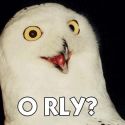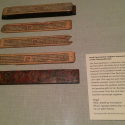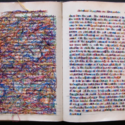
An insight underlying my view of written language is that written language necessarily takes a visual form. Well, that seems obvious, doesn’t it? But what it means is there’s not a clean line between what is “visual” and what is “verbal.” Even so, common parlance and academic discourse alike consider “visual” to be implicitly non-linguistic and “verbal” to be linguistic.
Text is readily considered “visual” only when it verges on graphic design, as in company logos and poster headlines. However, all text should be considered visual: We undeniably perceive text using our visual faculties; moreover, all text is formatted, and this formatting can contribute to a text’s meaning. Some work has explored the non-verbal aspects of text. Edward A. Levenston, for example, argues that literary meaning is derived not only from the cognitive/linguistic meaning of the words on the page, but also from how those words are presented. He surveys how spelling, punctuation, typography and layout can modulate a text’s meaning, using examples ranging from Aristophanes and Chaucer to Shakespeare and e. e. cummings.
Along these lines, W. J. T. Mitchell discusses the notion of “imagetext,” which recognizes that every medium is a mixed medium—that images and text are inextricable. Vivid descriptions conjure images, just as images conjure descriptions, and all text can be seen as interpreted pictorially or visually. Years later, in a 2005 paper, Mitchell concluded that “there are no purely visual media because there is no such thing as pure visual perception in the first place.” Indeed, all media are mixed media.
More recently, sociolinguists like Mark Sebba have begun to focus on how orthography can be a site for social action quite apart from anything inherent in the meaning of the words themselves.
This also comes to the fore in the notion of “document,” which I’ve been thinking about a lot recently as I’ve been preparing my prospectus for PhD candidacy. In past lives, I studied advertising and linguistics. I thought I loved linguistics, but somehow it was never viscerally satisfying to me. I realized why only recently, upon reflecting on the “document.” Linguists talk about texts, manifestations of language. But this ignores everything we just talked about—the fundamental and inescapable entanglement between text and page, content and form. The document acknowledges this, whereas other concepts don’t seem to.
This is just a very brief post, but there will be more to come.
 Follow
Follow

